Orphan pages are pretty much invisible to search engines and visitors.
They don’t rank well and may hurt your website’s online visibility.
This quick guide will help you to find and fix them.
Contents:
What Are Orphan Pages?
Orphan pages are web pages that don’t have any links to them from other pages on your website.
It means the only way to visit them is by directly typing the URL or through an external link.
For example, your website has a page about “blue widgets” but there are no links to it from any other pages on your site.
👉 As a result, the search engines have difficulty finding that page and will probably have little to no traffic.
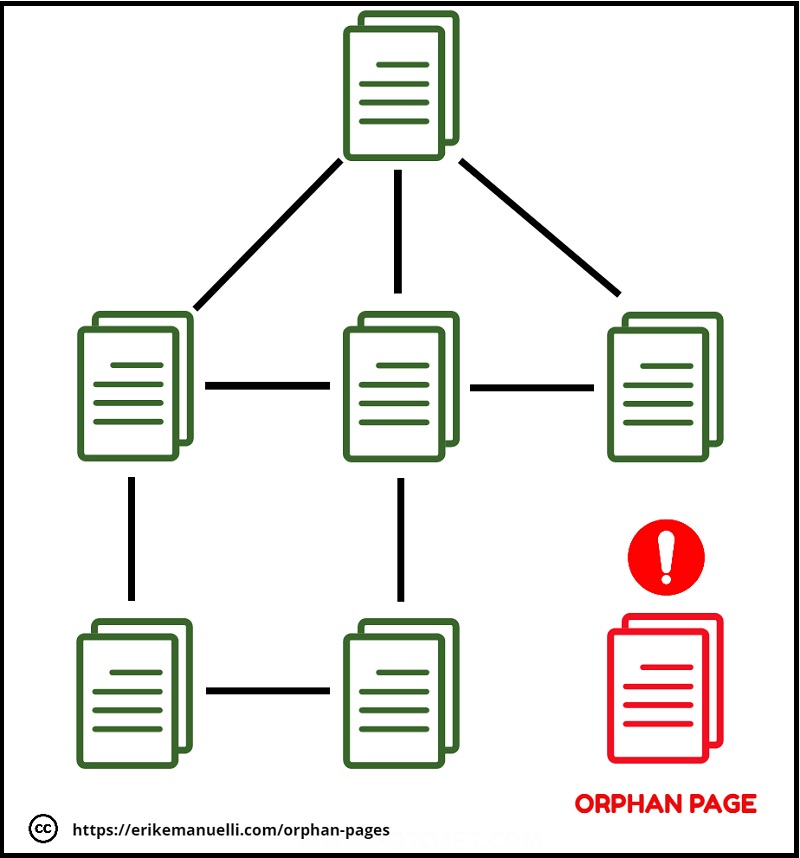
What Causes Orphan Pages?
There are a few reasons why you might have orphan pages on your website:
- You just created a new page and haven’t had a chance to link to it from other pages yet
- You recently changed the URL of a page (e.g. from example.com/about to example.com/about-us) and didn’t set up a redirect from the old URL to the new one
- Someone linked to a page on your website that doesn’t exist anymore (e.g. they linked to example.com/blue-widgets but it was deleted or renamed)
- You just changed your site design and the links are pointing to pages that don’t exist anymore
- You migrated your site to a new domain and didn’t set up redirects from the old URLs to the new ones
- You have bad website architecture
Why Are Orphan Pages Bad for SEO?
Orphan pages are bad for SEO because they:
- prevent search engines from indexing them (if they are not present on your sitemap);
- might take a portion of the crawl budget;
- can hurt the user experience.
Prevent Search Engines From Indexing Them
Google uses links to help find new content on the web.
If your orphan pages don’t have any links to them, search engines will have difficulty finding them.
In fact, read what is reported on Google Search Central:
Other pages are discovered when Google follows a link from a known page to a new page.

For example, if you publish a new page on your site and don’t link to it from your old content, how will Google know it exists?
✅ If you do eventually want the page to rank in the SERPs, you need to take some action.
Might Take a Portion of the Crawl Budget
Googlebot has a limited crawl budget, which is the number of pages it can and wants to crawl on your site.
Every website has a different crawl budget based on many factors, such as the size, the number of pages, the speed of the server, etc.
Now, consider this.
Google says that having many low-value-add URLs can negatively affect a site’s crawling and indexing:
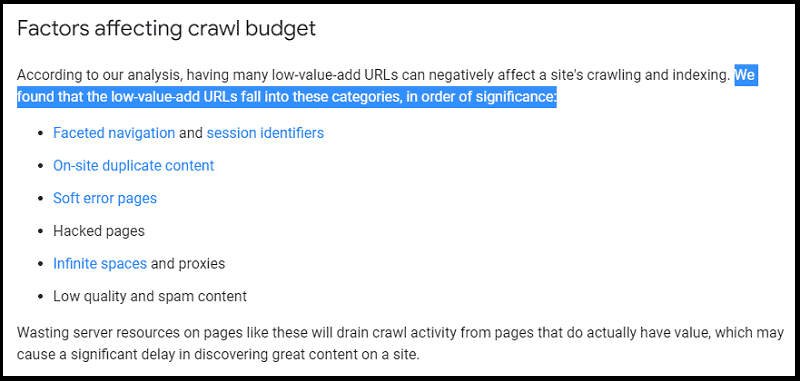
💡 It means that if you have many orphan pages on your site, they might take a portion of the crawl budget away from other more important pages (which potentially could have a higher chance of ranking in Google).
Can Hurt the User Experience
Orphan pages can also hurt the user experience because if someone stumbles across one of them, they will have no way to navigate to other parts of your site.
For example, let’s say someone is looking for information about “SEO statistics” and they find your orphan page about that topic. From here, there are no links to any other pages on your site, so the user has no way of finding anything else to read.
As a result, visitors will likely leave your site immediately and probably look for a different website (sending your bounce rate through the roof).
How Can You Find Orphan Pages?
✅ The best way to find them is by using an SEO tool like Ahrefs.
Run the feature “Site Audit“.
Once it’s completed, go to “Page Explorer” to look for all your pages.
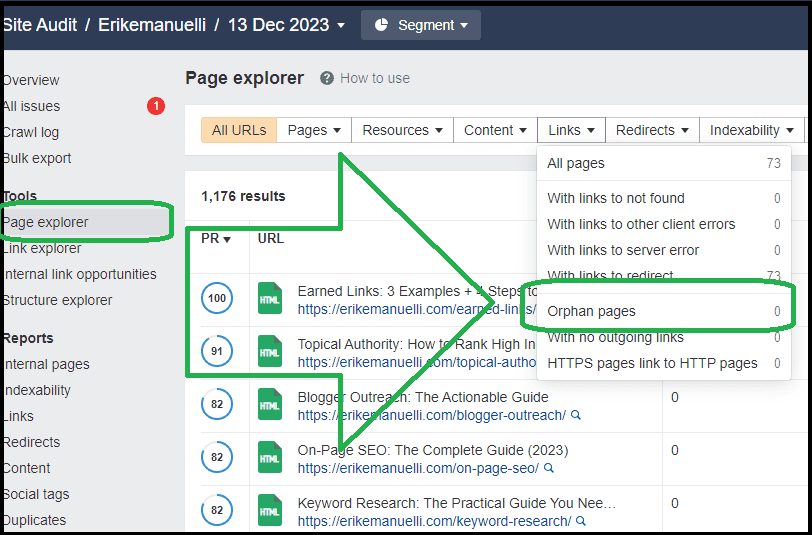
Then, click on the “Links” menu to discover if you have orphan pages on your site.
This is a premium feature and it’s also included in the basic plan, called “Lite” (currently at $89/mo).
If you want to try a free method, you can use Google Analytics.
Log in to your account and go to “Life cycle” > “Engagement” > “Pages and screens”:
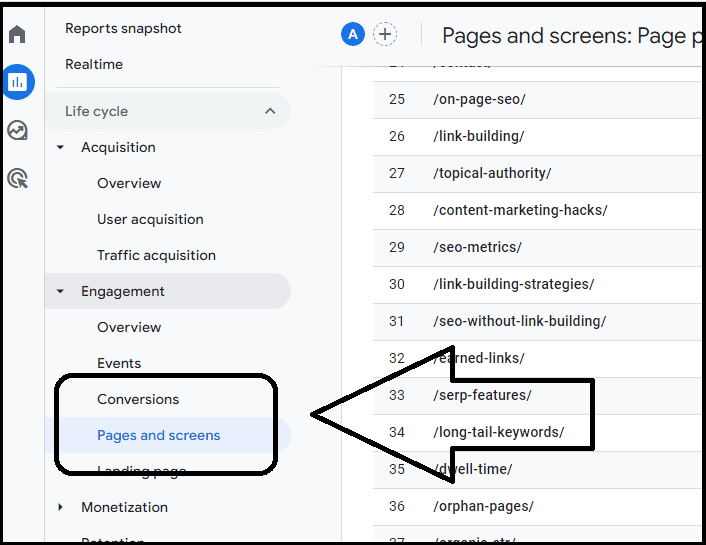
This will show you a list of all the pages on your website, sorted by how many page views they got in a specific time range.
Now, click on “Pageviews”, so to have the pages with the least views at the top.
To have the most results possible, amplify the time range to cover many years:
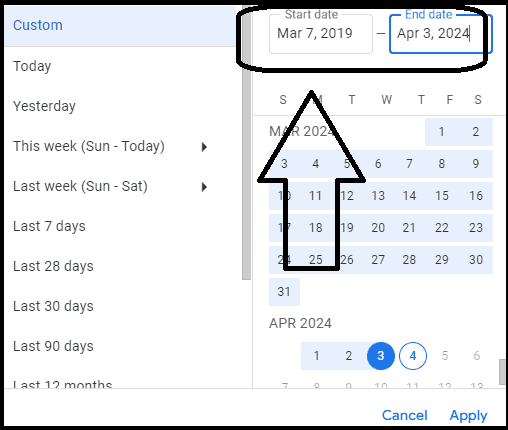
Finally, you may want to expand the list of URLs by selecting up to “5000 rows“.
If you see any pages with 0 (or a small amount) pageviews, those are likely orphan pages.
To be 100% sure, you need to compare the list of your crawlable URLs with the list of your Analytics URLs (refer to this guide).
How Can You Fix Orphan Pages?
There are a few different options for dealing with orphan pages:
- Redirect the page to another relevant page on your website.
- Delete the orphan page and 404 errors.
- Find external websites that link to the orphan page.
- Add internal links to the orphan page.
Redirect It
For example, if you have a page about “link building strategies” but it’s getting no traffic, you can redirect it to a page about “link building” that does get traffic.
Also, you may want to use the Redirect Path Chrome extension to monitor redirects on your site.
Delete It
If a page is orphaned and not getting any traffic, there’s no reason to keep it.
Just delete it and set up a 404 error so people know they’ve reached a dead end.
Find and Replace the Link
If you are getting some traffic from external websites, try reaching out to the owner of the site that is linking to your orphan page and asking to replace the link with a more relevant of your web content.
Add Internal Links
If you have an orphan page that has value and you think it could be useful for your users, try adding links to it from other pages on your website, to help Google find the content and include it in the search rankings.
Orphan Pages FAQs
Q: Can Google crawl orphan pages?
A: Yes, Google can crawl orphan pages, but it might take longer for them to appear in the search engine results. Therefore, it is important to internally link from other pages on your site so they can be found more easily. Additionally, make sure that your server speeds are optimized so that the crawling process will happen faster.
Q: Is deleting pages bad for SEO?
A: Not necessarily. If a page is an orphan, it might be better to delete it and set up a 404 error instead of keeping it on your website. This will help you avoid wasting the crawl budget on important content, and it will also help the user experience. However, if the page has some SEO value or traffic coming from external sources, you might want to consider redirecting it instead.
Q: What are zombie pages?
A: Zombie pages are similar to orphan pages, but they can still be found by search engine crawlers. They usually have some internal links pointing to them, although those links may not be very visible on the page. Zombie pages usually don’t get much traffic, and they often contain outdated content that should be updated or deleted.
Q: How can I prevent orphan pages?
A: The best way is to make sure that your website is properly linked and organized. Additionally, you should regularly monitor your website for any broken links or redirects, and remove any outdated content.
Before You Go
Taking care of orphan pages is an important part of maintaining a healthy website and should be included in your SEO strategy.
But wait! There’s much more you can do.
For example, organizing your site:
Or, understanding how the crawl budget works:
Now, over to you.
Have you ever dealt with such kind of issues on your website?
What did you do?
Let me know in the comments below!

Hi Erik,
I think there are many instances where it’s deliberate not to link to specific pages from the website – in this case, there’s no reason to worry about its impact on orphan pages to SEO.
However, you’ve shared valuable tips on fixing and knowing all about orphan pages in SEO.
Thanks for sharing.
You’re right, Shamsudeen.
It really depends on the kind of business you’re running, the type of website, or the content strategy.
Thanks for sharing your views here.
Wow. cool. i never knew about orphan pages and it’s negative effects. thanks for sharing.
You’re welcome!
I’m glad I found this post, Erik. I’ve definitely got some orphan pages. I’ll be following your advice to find them all. Thanks!
Hi Sabina,
nice to hear you learned something new from this guide.
Orphan pages are bad for SEO and user experience. It’s good to fix them!